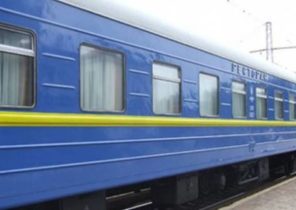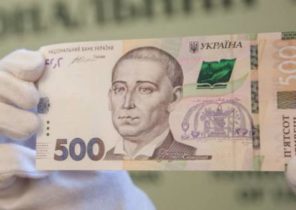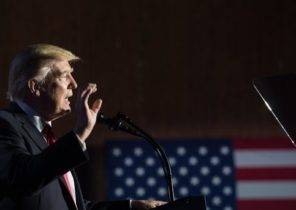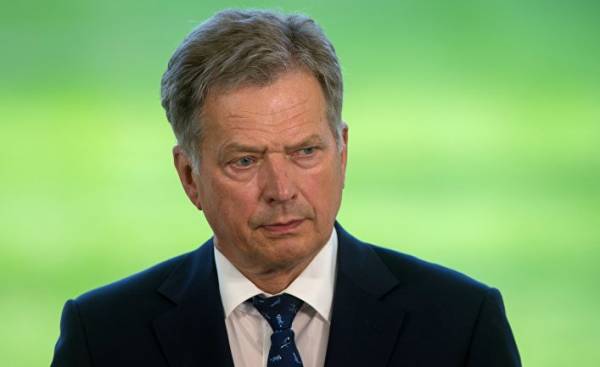
Helsinki — this year Finland will be one hundred years. This is a story of survival, and nobody knows how long she was destined to continue. The President of Finland Sauli Niinistö (Sauli Niinistö) believes that in the modern world of cyber warfare the main and most important defense should be conducted “between the ears”.
“The defense can be conducted not only with weapons in their hands. Defense is still and independent thinking, critical attitude,” said Niinistö in an interview for the newspaper Dagens Nyheter at the residence of the Finnish President, Mäntyniemi, in Helsinki.
“We are building Finland all together.”
This text is printed in white paint on the construction shed near the Parliament building in Helsinki. There is a repair of the Parliament and it will end by the summer, just before the centenary. The repair cost will be two times higher than originally planned. Finnish democracy was much more expensive.
December 6 will mark one hundred years since, as the Parliament of Finland declared the country’s independence from the Russian Empire. Since Finland went through a civil war, two wars with the Soviet Union, a bitter peace, recovery after the war — and almost incredible development from a poor, post-war country to a full-fledged Scandinavian welfare state. EU membership in 1995 was the culmination of political and economic integration with Western Europe.
Then no one could not imagine that 20 years later Britain decides to withdraw from the EU, right-wing populism will reap a growing harvest in the rest of Europe, and Russia would invade a neighboring country and annexing part of its territory. Not to mention the fact that the most powerful country in the world will be under the management of irritable and unpredictable populist.
The course of events of this kind always unpleasant for the smaller countries that are very dependent on how are treaties. This applies particularly to small countries, whose border with Russia stretches for more than a thousand kilometers.
Sauli Niinistö prefers preventive measures. Simply put, we are talking about defense and that’s about it, we almost immediately and begin to speak during a meeting in Mäntyniemi, the residence of the Finnish President in Helsinki. It is beautifully situated on a rocky promontory, 15 minutes from the centre of Helsinki.
DN: Finland gained independence in a period when Europe was plunged into chaos. Now, when Finland celebrates 100 years since, the situation is also very strange and unpredictable. You see there is something in common?
Sauli Niinistö: Not quite. A hundred years ago was the First world war, Europe experienced a national revival. In Finland it was the same. Needed to achieve independence, to free ourselves from foreign power. Today we have the war — in any case, the world. Instead, the war goes on locally here and there.
But the situation is such that Russia in recent years is acting very aggressive. At a press conference with Putin last summer you said that Finland is the best in Europe ready to defend.
Yes.
— Why was it so important to report it?
— This is important and will remain important. Now constantly propaganda, hybrid warfare, cyber security and so on. In practice this means that national defense is everybody’s business, and the defense of this last but not least need to have himself between your ears. It is important that the citizens knew it. The defense can be conducted not only with weapons in their hands, the defense is still a critical view of information, reaction to different inconsistencies. Deep-seated awareness that it is important to defend the country, is valuable in itself. Then the ability of people to defend the country against such threats is greatly increased.
— Do Finland with the information war?
— We have, for example, there is this Johan Backman (Johan Bäckman). He behaves very actively. But to no avail!
Johan Beckman is associate Professor of history, who in the last ten years embodies the Russian propaganda in Finland. He often gives interview on Russian state television organized so-called anti-fascist organization in Finland and is constantly attacking critical of the Kremlin journalists.
When Bachmann was campaigning for municipal elections in Espoo in 2012, he received 43 votes.
Niinisto smiles.
— Finns seem to be critical.
Why?
Well… Perhaps because in a hundred years people have learned this way of thinking. You need to always be alert.
— In relation to what?
— All of it. Probably to do with the willingness of the Finns to defend themselves, they want to defend their country. This is not something new, this will born a long time ago from my experience the Finns experience.
In Finland in the postwar era retained conscription, and about 80% of all men serve. In 2013, a civil initiative was an attempt to collect enough signatures to repeal conscription. The result was a failure of the 50 thousand signatures required for Parliament to raise the issue, managed to collect only a small part.
— Sweden recently returned military service. What do you think?
— I think that’s good. After decades of peace, we began to understand something, and this applies not only to Sweden but many other countries in Europe. Many countries have ceased to keep that in mind — that something might happen. Now they realized it. Nothing good in fact that we have to act in this direction! But it is correct that this is done. Because it is compulsory.
— At the same time in Finland criticize the limitations of the police and border authorities.
— With regard to border protection, it is quite natural that we were able to spend fewer resources on the Western border, after along with Sweden became members of the EU. But until the fall of 2013, the situation on the Eastern border was crisp and clear, with no significant changes. The Russians performed the protection of the border as it should. Then the situation changed.
At the end of 2015 and early 2016, Russia began to miss in Finland people without a Schengen visa — this has never happened. Most sought asylum in Finland, despite the fact that we lived in Russia for many years. Many were students who had obviously not had reason to seek asylum.
After that, we began a debate about the intensity of the border guard of Finland. Once again, we allocated more resources to help the police.
— Is it enough?
— We in Finland are no special problems with the order.
Now in Finland is another discussion on security. The defense Ministry wants to amend the law, which is that, for example, professional officers or other persons in key positions in the defense sector may only have Finnish citizenship. The main reason not to speak openly, was the fact that the country lives about 20 thousand people, having both Russian and Finnish citizenship, and the number of individuals with Russian citizenship is growing from year to year. Meanwhile, Russia officially stated that it considers it its duty to protect its citizens abroad.
Niinistö himself repeatedly raised the issue of dual citizenship. When I asked about it, he goes from Swedish to Finnish, because he wants to speak as clearly as possible.
— It is obvious that in the world there are two types of attitude to dual citizenship. Some countries recognize it, others do not. If you don’t admit it, you do not recognize this right for other countries — because in this view of dual citizenship does not exist. Here the question arises: who is to obey the person with dual citizenship? Finland considers the second of equal citizenship Finnish. Not so with a country that does not recognize the existence of dual citizenship. For a country exists only its own citizenship.
Russia does not recognize dual citizenship except in special cases, such as family circumstances and the like. In Finland there is no such restriction.
Sauli Niinistö pays much attention to relations of Finland and Russia. Perhaps, there is nothing surprising in the fact that he at the same time becoming more and more a staunch patriot of Scandinavia. When I ask about the attitude towards Sweden, whose part of Finland was more than 700 years — much longer than skåne, — I hear in his response to the emotional charge.
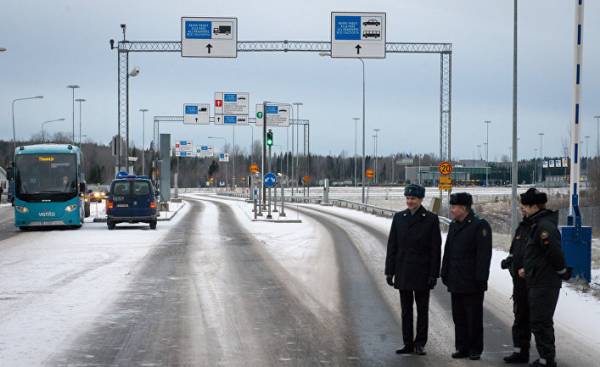 © RIA Novosti, Alexey Danichev | go to photobacteria and Russian customs officers at the border checkpoint cars MAPP”, Nujamaa” on the border of Finland and Russia
© RIA Novosti, Alexey Danichev | go to photobacteria and Russian customs officers at the border checkpoint cars MAPP”, Nujamaa” on the border of Finland and Russia
— We know each other century, more than a thousand years. Finland a part of Sweden means much more than just a part of Sweden, Finland helped to create a country. The Swedish legal system has become our legal system, and when Finland became part of the Russian Empire, the Tsar promised that Finland would continue to operate the Swedish Constitution. This story is also interesting from the point of view that Sweden changed its Constitution almost immediately after these events. We in Finland held to it nearly a hundred years.
The fact that the Finnish legal society rests on a buffet basis, is essential for Sauli Niinistö. When the king in the late nineteenth century began to take measures of Russification and constantly tried to limit the autonomy of Finland, the Finns were called upon to defend the Swedish Constitution.
Swedish Constitution helped protect the autonomy of Finland and helped to create a national feeling, from which we started our conversation. And even though we were part of the Russian Empire for over a hundred years, Finland has survived the Swedish-speaking minority and its culture. Both groups mingled with each other. This is important.
Cooperation with Sweden becomes increasingly important, and it is based not only on the issues of defense and economy. We have with Sweden deep understanding and shared values, says Niinistö.
He recalls his visit to Stockholm together with his wife Jenny, Haukio (Jenni Haukio) (the author of several collections of poetry) a few years ago.
— We went to one concert where I met Stefan and Olle Leven (Stefan, Ulla Löfven — the current Prime Minister of Sweden and his wife, approx. TRANS.). Stefan asked Jenny who her favorite Finnish poet. Jenny replied that Eva Kilpi (Eeva Kilpi). And then Stefan and Ulla immediately began to quote Kilpi, Swedish. It made an impression on me. Probably I never came across with this understanding of Finnish culture in Sweden, that it is so appreciated.
Niinisto smiles a little sheepishly.
— Unfortunately, I have to admit that I can’t turn to quote any of the Swedish poet.
Finland is the only, except for Sweden, a country in the world where the Swedish language according to the Constitution is an official, along with Finnish. As you can see, Niinistö belongs to those authorities who believe that the Swedish element in Finland is important for historical and existential reasons. Right populist “True Finns”, who now occupied a place in the government, hold the opposite opinion, and consistently try to achieve cancellation of the Swedish language in Finland.
Recently, the government decided that Finland will experiment with several voluntarily selected by the schools, replacing compulsory Swedish as a second language to some other language according to the preliminary proposal, Russian in schools in Eastern Finland.
— Let’s talk about the significance of the Swedish language in more General terms, says Niinistö, when I ask him about the experiment When I, as a Finn, around the world, I almost always ask questions about the Scandinavian model. After all, we know very well that the Scandinavian States are a unique group of countries, and very respected in the world. Now there are global changes.
At the same time, the existence of the EU into question. Against this background connection with the Scandinavians in the future will become even more important. And since we full will to participate, it’s good that in Finland speak Swedish.
He Niinistö spoke Swedish most of the interview. When he wants to Express something particularly clear, he switches to Finnish, and then back to Swedish.
Niinistö closely follows the events after the election trump and promotion of populism in Europe.
— As election trump will affect Finland?
— Trump during his election campaign spoke loud words. In practice, not so easy was to fulfill all that he promised. He is not the only politician who expressed it this way during the election campaign, and then faced problems.
What’s next? What he’s thinking on trade? We’ll soon find out. I have not heard that he said something negative about the Agreement on free trade zone with the EU, for example.
— What happens if marine Le Pen (Marine Le Pen) is elected President of France?
I don’t like to speculate about the bad.
But why now are populists so successful?
— It depends on the country. In the Netherlands a few different groups of voters in support of Geert Wilders (Geert Wilders), not only right-wing extremists, but voters who are dissatisfied with the system that they had year after year. The same reason lies behind the success of “True Finns”. People are tired of the old system with three large parties, two of which always sit in the government. And if this is the main reason, including the success of the Wilders, they don’t deserve to so much trouble as we thought.
When the populists come to power in large powerful countries, most importantly the EU to survive, says Niinistö.
We must not let the EU disintegrate. This is important to Finland and all European countries — but especially for the little ones.
At the same time, Niinistö carefully follows his own style in the role of the President of Finland. After the annexation of Crimea, many of the leaders of the EU countries — with Sweden at the head — I chose to freeze the contacts of the highest level with the Russian government. Niinistö acted differently and met regularly with Putin.
Therefore, the recent meeting between the Minister for foreign Affairs Margot Wallström (Margot Wallström) with Russian counterpart Sergei Lavrov in Moscow can be regarded as a small triumph Niinistö. In any case, he does not mind.
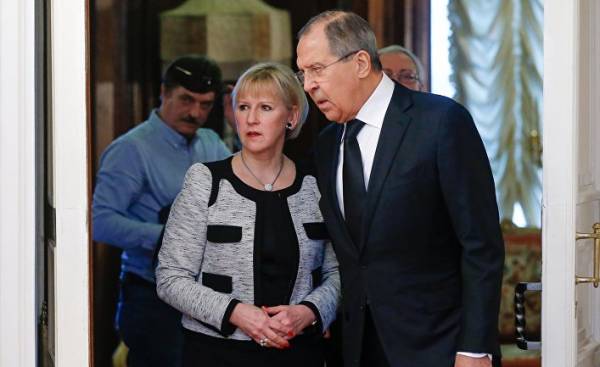 © RIA Novosti, Vladimir Astapkovich | go to fotomancer of foreign Affairs of the Russian Federation Sergey Lavrov and Minister of foreign Affairs of the Kingdom of Sweden Margot Wallström
© RIA Novosti, Vladimir Astapkovich | go to fotomancer of foreign Affairs of the Russian Federation Sergey Lavrov and Minister of foreign Affairs of the Kingdom of Sweden Margot Wallström
— Perhaps, our relations with Russia are somewhat different from the Swedish. We do not hide. But we all knew that between Russia and the European countries continue to exist a lot of contacts. Even in the US, these contacts were. But it is done informally. And we have no reason to keep silent about our dialogue with Russia. At the last NATO summit were also discussed contacts with Russia.
— What, in your opinion, have you achieved thanks to these contacts?
— I know something about the Russian way of thinking when it comes to global issues. More than can be read or to learn from public sources. And, of course, we have a common border. Often we need to discuss with Russia the things that do not lie in the political field.
Meanwhile, the fact remains that the Kremlin is skillfully transforms practical issues in political, when it is to his advantage. For example, at the end of 2015, Russia suddenly and without warning opened the border with Finland. A few months later Niinistö met with Medvedev in Munich and very clearly gave to understand that Finland is not like the new line.
Medvedev refused to admit guilt. But the incidents stopped.
— Have you ever been angry with Putin?
— Anger will not help. Of course, you need to very carefully analyse what might be behind some phenomena, that’s what I was thinking. Norway had the same problems, and in the Norwegian report suggested that it was an accident. But I don’t think so. In this way, Russia gave the signal. Because then Russia has officially stated that they are well guarded by its border, while the EU pays billions of Turkey.
— The incident is symbolic in the context of the shared history of Russia and Finland. You should always be prepared for the fact that the Treaty will be broken. How do you feel about this circumstance?
We don’t have to constantly walk on eggshells. We are talking, discussing problems. But, on the other hand, we are strengthening the defense of Finland. It is important that all knew about it, and outside Finland too. It helps in the dialogue with Russia.
— A Russian understand?
They know Finland.
More the President says nothing.
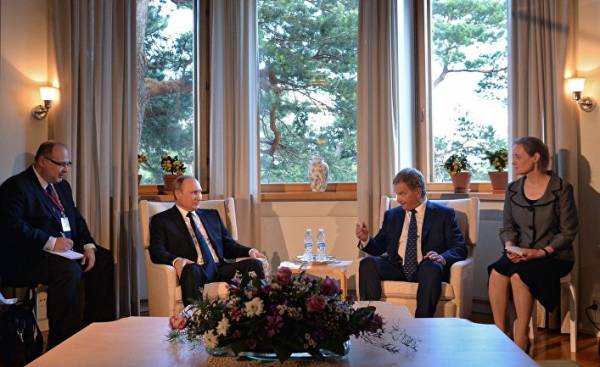 © RIA Novosti, Alexei Druzhinin | go to Photobacterium of the Russian Federation Vladimir Putin and Finnish President Sauli Niinistö during a meeting in Naantali
© RIA Novosti, Alexei Druzhinin | go to Photobacterium of the Russian Federation Vladimir Putin and Finnish President Sauli Niinistö during a meeting in Naantali
Facts. Sauli Niinistö (Sauli Niinistö)
Age: 68 years
Career: Lawyer. Member of the Parliament of Finland from 1987 to 2003 and from 2007 to 2011. The Chairman of the party national coalition between 1994 and 2001. The Minister of justice in 1995-1996. The Minister of Finance in 1996-2003. The Parliament speaker in 2007-2011. In 2012 he was elected President of Finland for a six year term.
For the post of Finance Minister Niinistö was the most popular politician in Finland. His honest rough style came to taste the Finns, and in the 2007 parliamentary election he received the most votes in history.
Niinistö became a widower in 1995 when his wife died in a car accident. He has two adult sons, Mathias and Nuutti. In 2009 he married again — Jenni, Haukio, the poet, who published several books. Another family member — Boston Terrier Lenny.
In 2004, he and his son Mathias was able to survive during the tsunami in the town Experiencing (Thailand — approx. ed.), tightly grabbing hold of a telephone pole.
Niinistö has written several books, including Viiden vuoden yksinäisyys (“Five years of solitude”) about their widowhood.
President
Finland is a Republic with narodoizbrannogo President at the head.
In 2000, the Constitution was changed, and the powers of the President were reduced, primarily in the sphere of foreign policy. Today the most important task of the President to engage in foreign policy with the government.
